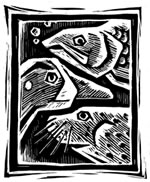- Home
- Restoration Projects
- Project Search
- HRM Program: Herring Genetic Stock Structure 15120111-P
Project Information
Title: HRM Program: Herring Genetic Stock Structure 15120111-P
Project Year and Number: 2015: 15120111-P
Other Fiscal Years and Numbers for this Project: 2016: 16120111-P, 2014: 14120111-P, 2013: 13120111-P, 2012: 12120111-P
Principal Investigator (PI): Jeff Guyon, Sharon Wildes (NOAA Fisheries)
Managing Agency: NOAA
Assisting Personnel: None
Project Website: https://pwssc.org/genetic-stock-structure/
Research Location: Prince William Sound
Restoration Category: Monitoring, Research
Injured Resources Addressed: Pacific Herring
Abstract:Understanding if there is one PWS herring stock or multiple stocks is important for proper management of fisheries. We propose to study the genetic uniqueness of herring from PWS to determine if it may be a complicating factor in the recovery process. A previous genetic study of herring in the region indicated that the PWS herring population was genetically distinct from other stocks spawning outside the Sound (O’Connell et al. 1998), providing an impetus for additional work. Several recent studies have made advancements in herring research using microsatellite loci, and have detected fine-scale genetic differentiation among local regions of herring (Beacham et al. 2008; Andre et al. 2011; Wildes et al. 2011). Each microsatellite locus contains multiple alleles making microsatellites ideal genetic markers for analyzing migratory fish with limited stock structure like herring. Based on our experience studying Pacific herring in Southeast Alaska using microsatellite markers (Wildes et al. in 2011), successful completion of this proposal will require (1) increasing the number of genetic samples per collection from the 50 used in the previous analysis (O'Connell et al. 1998) to 150 fish, (2) using an increased number of informative markers (from 5 to 15), (3) analyzing at least two years of collections to examine temporal stability, and if sampling allows (4) spatial stability from collections from two different historical locations (east, west). Evaluation of temporal and spatial variation of herring population(s) in and around PWS using updated genetic protocols will provide important information about herring life history that will contribute to improving the application of the ASA model.
Proposal: View (30 KB)
Reports:
Annual Report FY15: View (107 KB)
Final Report: See Project 16120111-P
Publications from this Project: None Available
